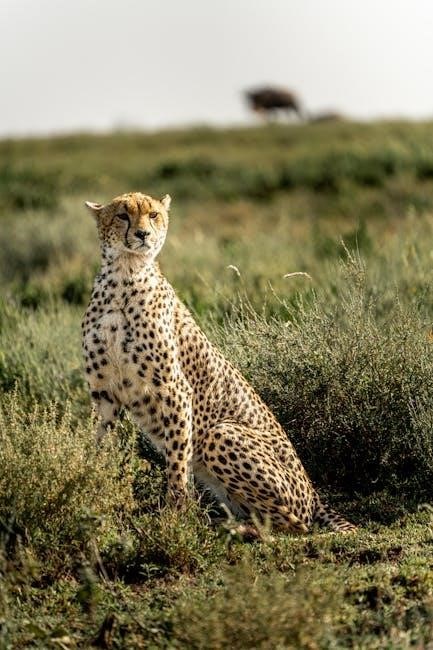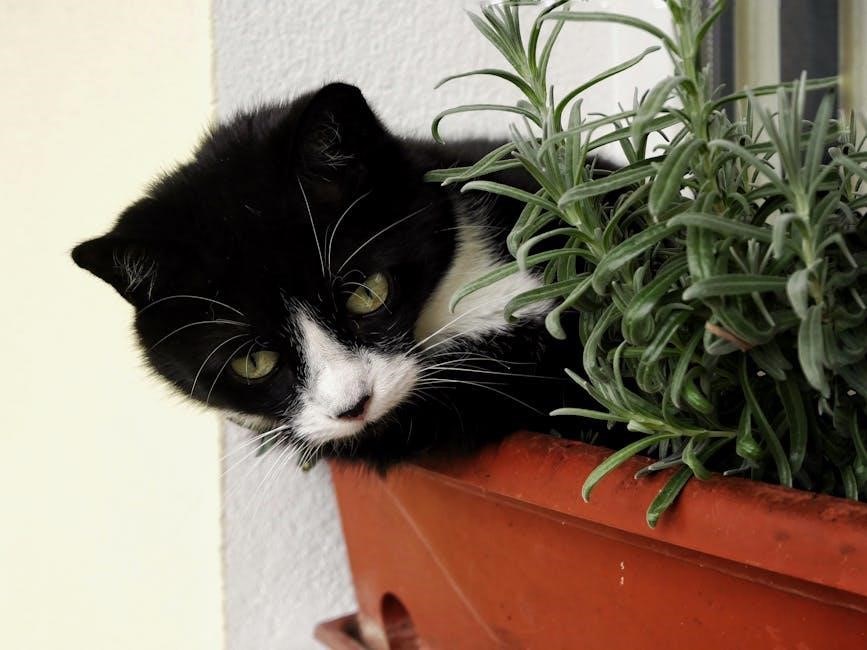Welcome to the essential guide for Medicine Cats, detailing the natural remedies and healing herbs used to treat wounds, cure illnesses, and maintain Clan health and well-being.
Overview of Herbs in the Warrior Cats Universe
In the Warrior Cats universe, herbs are essential for treating injuries, curing illnesses, and maintaining the health of Clan members. These plants, often inspired by real-world remedies, are carefully selected for their medicinal properties. Herbs like alder bark, blackberry leaves, and borage leaves are used to alleviate pain, reduce fevers, and support nursing queens. Medicine Cats, skilled in herbalism, gather and store these remedies in their dens. The effectiveness of these herbs is rooted in their natural healing qualities, passed down through generations of Clan medicine cats. This traditional knowledge ensures the survival and well-being of the Clan, making herbs a cornerstone of their medical practices.
Importance of Herbal Medicine for Medicine Cats
Herbal medicine is vital for Medicine Cats, serving as their primary tool to heal wounds, cure illnesses, and maintain Clan health. With no access to modern medical resources, Medicine Cats rely on their deep understanding of natural remedies. Herbs like alder bark, blackberry leaves, and borage leaves are essential for treating toothaches, bee stings, and fevers. This knowledge, passed down through generations, ensures the Clan’s survival and well-being. Medicine Cats are responsible for gathering, preparing, and administering these remedies, making their role indispensable. Their expertise in herbalism is crucial for sustaining life and health within the Clan, highlighting their integral position in Warrior Cats society.

Common Herbs Used by Medicine Cats
Medicine Cats rely on herbs like Alder Bark, Blackberry Leaves, and Borage Leaves for their healing properties, using them to treat wounds, fevers, and support queens effectively.
Alder Bark: Usage and Benefits
Alder Bark, stripped from alder trees, is a versatile herb used primarily to ease toothaches and mouth pain. Found in wetland areas, it is chewed into a pulp by Medicine Cats and applied directly to the affected area. Its natural anti-inflammatory properties help reduce swelling and alleviate discomfort, making it a crucial remedy for dental issues. Additionally, Alder Bark can be used to treat minor mouth injuries, promoting healing and preventing infection. Proper storage in dry conditions ensures its effectiveness, making it a staple in every Medicine Cat’s collection for maintaining Clanmates’ oral health and overall well-being.
Blackberry Leaves: Healing Properties and Applications
Blackberry Leaves are a valuable herb for Medicine Cats, known for their effectiveness in treating bee stings and minor wounds. Found on blackberry plants, these leaves are rich in tannins, which help reduce swelling and soothe pain. Medicine Cats often chew the leaves into a pulp and apply them directly to the affected area to neutralize stings and promote healing. Additionally, Blackberry Leaves can be used to treat mild skin irritations and insect bites, making them a versatile remedy in a Medicine Cat’s arsenal. Their accessibility in various terrains ensures they remain a reliable option for maintaining Clanmates’ health and well-being during patrols and hunts.
Borage Leaves: Their Role in Treating Fevers and Supporting Queens
Borage Leaves, with their hairy texture and star-shaped flowers, are a vital herb for Medicine Cats. They are primarily used to lower fevers and assist Queens in producing milk for their kits. Medicine Cats chew the leaves and mix them with other remedies to create effective treatments. Borage Leaves are also known to strengthen a cat’s overall health and are often administered to nursing mothers to ensure healthy litters. Their versatile properties make them a cornerstone in Clan medicine, particularly during times of illness or childbirth, ensuring the well-being of both Queens and their kits. They are a testament to the natural healing wisdom of the Clans.
Poultices and Mixtures in Warrior Cats Medicine

Poultices and mixtures are essential in Clan medicine, combining herbs like Goldenrod and Horsetail to treat wounds and infections. These blends are crucial for healing and strength.
Goldenrod, Horsetail, and Marigold Poultice: Its Purpose and Effectiveness
The Goldenrod, Horsetail, and Marigold poultice is a potent remedy used by Medicine Cats to treat wounds, reduce inflammation, and combat infections. Goldenrod, known for its antiseptic properties, helps cleanse injuries, while Horsetail accelerates healing and stops bleeding. Marigold, with its anti-inflammatory traits, soothes skin irritations and prevents infection. Combined, these herbs create a powerful mixture that promotes rapid recovery and strengthens the immune system. This poultice is particularly effective for deep cuts, burns, and infections, making it a cornerstone of Clan medicine. Its natural ingredients ensure safety and efficacy, making it a trusted solution for healing wounded warriors and maintaining Clan health.
Traveling Herbs Mixture: Ingredients and Benefits
The Traveling Herbs Mixture is a vital concoction for Medicine Cats, designed to sustain Clan members during journeys and hunts. Comprising daisy leaves, sorrel, chamomile, and burnet, this blend suppresses hunger, boosts energy, and strengthens cats. Daisy leaves provide essential nutrients, while sorrel aids digestion and chamomile calms nerves. Burnet adds stamina, ensuring cats remain vigorous during long travels. This mixture is easy to prepare and portable, making it a crucial resource for maintaining Clan vitality and ensuring survival on challenging expeditions. Its balanced ingredients support overall health, proving indispensable for Medicine Cats caring for their warriors on the go.
Poisonous Herbs and Their Dangers
Poisonous herbs pose significant risks to Clan cats, causing severe illnesses or even death. Medicine Cats must identify and avoid toxic plants to protect their kin effectively.
Identifying and Avoiding Toxic Plants in the Wild
Identifying toxic plants is crucial for Medicine Cats to protect their Clan from poisoning. Many poisonous herbs, such as yew, hemlock, and nightshade, grow in the wild and can be deadly if ingested. These plants often have distinct features, like bright berries or shiny leaves, which can make them tempting but dangerous. Medicine Cats must learn to recognize these plants by their appearance, odor, and growth habits. Avoiding areas where toxic plants thrive and teaching apprentices to identify them are essential steps in preventing accidents. Proper training and experience are vital to ensure the safety of all Clan members.
Consequences of Misusing Herbs in Medicine
Misusing herbs can lead to severe consequences, including prolonged illness, poisoning, or even death. Incorrect dosages or improper preparation of herbal remedies can worsen a cat’s condition. For example, while some herbs like borage leaves are safe for lowering fevers, others, such as yew berries, are highly toxic and deadly. Medicine Cats must ensure they accurately identify and prepare herbs to avoid harming their Clanmates. Misuse can also undermine trust in the Medicine Cat’s expertise, potentially endangering the entire Clan. Proper knowledge and caution are essential to prevent such tragic outcomes and maintain the integrity of herbal medicine.

The Medicine Cat’s Role Beyond Herbs
Medicine Cats are vital spiritual leaders, performing ceremonies, interpreting omens, and offering guidance. They connect the Clan to StarClan, ensuring harmony and balance within the community.
Spiritual and Ceremonial Duties of Medicine Cats
Spiritual and Ceremonial Duties of Medicine Cats
Medicine Cats serve as spiritual leaders, performing sacred ceremonies like the Warrior Ceremony and naming rituals. They interpret omens from StarClan, guiding their Clan with wisdom and foresight. During the Moonlight Gathering, Medicine Cats lead their Clan to the sacred meeting place, ensuring spiritual unity. They also perform the Kitting Ceremony, welcoming newborns, and the Warrior’s Farewell, honoring those who have passed. These duties highlight their vital role in maintaining the Clan’s spiritual balance and connection to their ancestors. Their wisdom and insight are essential to the Clan’s harmony and prosperity.
Healing Remedies Without Herbs: Alternative Methods
Beyond herbs, Medicine Cats employ other natural remedies. Honey soothes throats, calms infections, and aids in swallowing remedies. Rest and hydration are crucial for recovery. They also use techniques like licking wounds to clean them and applying warm compresses to reduce swelling. Emotional support and reassurance play a vital role in a cat’s healing process. Additionally, Medicine Cats may use rituals or spiritual connections with StarClan to guide their healing practices. These methods complement herbal treatments, ensuring a holistic approach to medicine. They are essential when herbs are scarce or unsuitable for certain conditions, showcasing the Medicine Cat’s versatility and deep understanding of natural healing.

Herb Storage and Care
Herbs are stored in dry, shaded areas to preserve potency. Medicine Cats use large leaves or animal stomachs to keep them fresh and protected from moisture.
Best Practices for Storing Herbal Remedies
Herbal remedies should be stored in a cool, dry place to maintain their potency. Medicine Cats often use large leaves or animal stomachs as natural containers.
Herbs like daisy leaves and chamomile should be kept away from direct sunlight to prevent degradation. Moisture can spoil remedies, so they are stored in well-ventilated areas.
Some herbs, such as those growing in sandy soil, may require occasional watering to stay fresh. Proper storage ensures remedies remain effective for treating injuries and illnesses.
How to Grow and Maintain Herbs for Medicine
Medicine Cats carefully cultivate herbs in areas with suitable soil and sunlight. Herbs like borage thrive in damp soil, while daisy leaves prefer well-drained ground. Regular watering is essential, especially for herbs growing in sandy areas, which may require more frequent hydration. To protect herbs from pests or damage, Medicine Cats often guard the growing areas. Harvesting is done when leaves are mature to ensure maximum potency. Proper care ensures a steady supply of fresh, effective remedies for treating Clanmates. This attention to detail reflects the Medicine Cats’ dedication to their role in maintaining their Clan’s health and well-being.